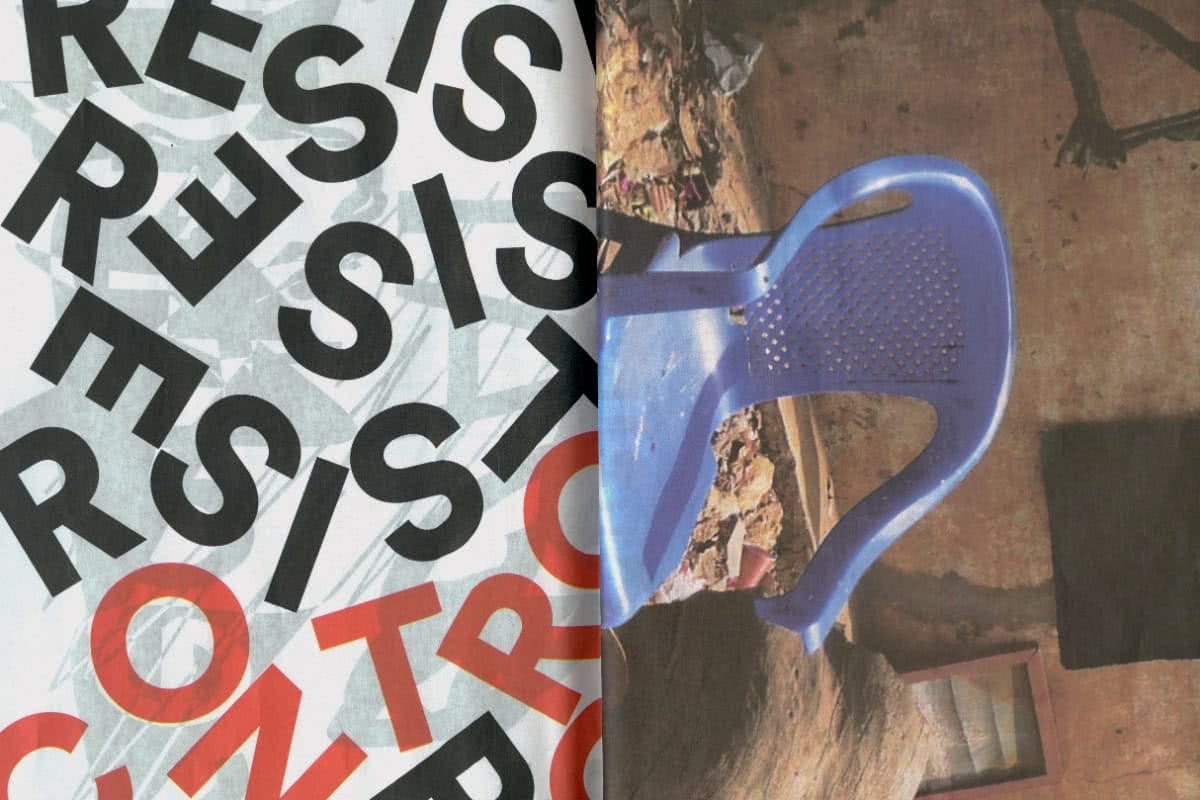

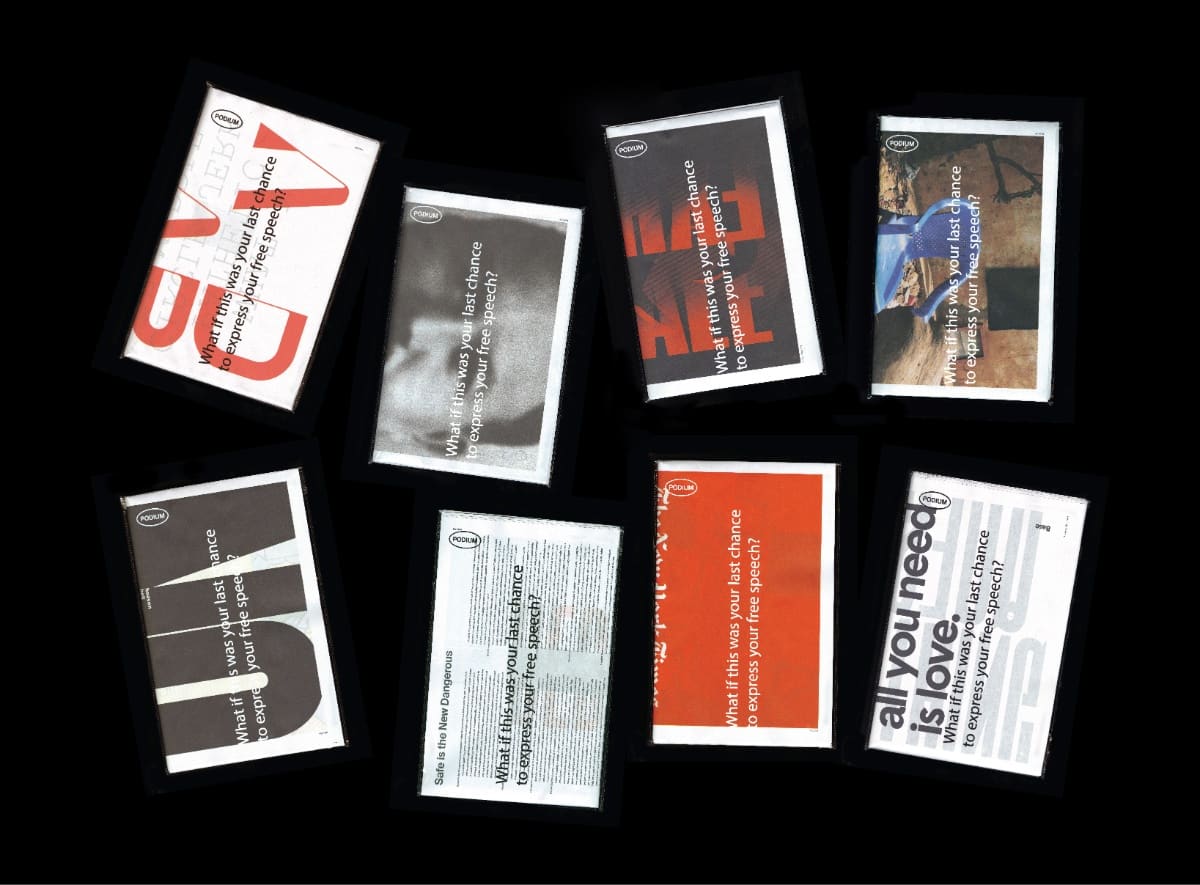
 June 8th, 2018
June 8th, 2018
Collaboration. What seems like a buzzword in present-day reality – if truly lived – does come with its up and downs. Collaboration means listening to others. Collaboration means letting go of ownership. Collaboration means trust.
Throughout the course of the elective »Collaborate or Die!«, led by Adrian Shaughnessy, we, a group of nine aspiring collaborators, had to find a way to learn how to collaborate and then truly live up to it.
To become a collaborator you should think in scales. Once one understands the collaborative dynamics within a smaller group of people, you can take it to any scale and size of group you like. But for now: baby steps.
In the first term, it required a sure amount of dedication and many failed attempts to work together smoothly. Once everyone got to know each other, especially the way of thinking and practice related expertise we did feel that the group dynamics had changed. Ideas were now no longer passed on from point A to B but circulated within the group and everyone felt positive about speaking out and contributing to the common approach to tackling our brief. By the end of the term, the administrative, personal and collaborative mechanics of our group were in sync and defined to a point where we felt confident enough to take the collaboration outside the protective walls of the college.
This belief made us feel confident enough to respond to the brief »Make a magazine. Any magazine.« in a – for all of us – new way. Since it became apparent that collaboration can only truly function when the noun becomes an action word, we decided to: collaborate!
Our collective response to the brief turned into the publication: PODIUM. A magazine dedicated to open conversations around the right to free speech and a representation of our understanding of collaboration. The content of this publication wasn’t produced by us. Instead, we invited thinkers, writers, designers, journalists, and illustrators to respond to a brief. Every contributor was given a page in the publication to use however they saw fit in order to answer the question: What if this was your last chance to express free speech?
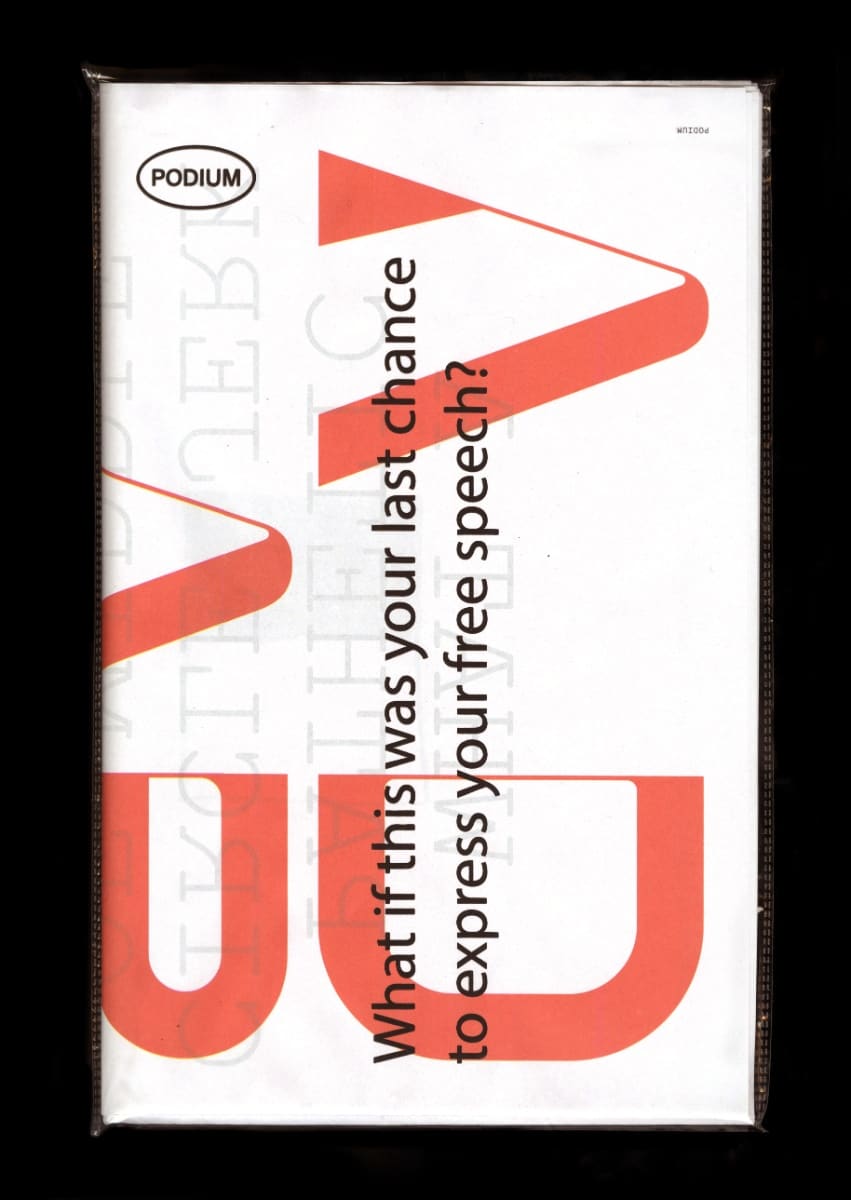
Our manifesto: PODIUM is a graphic design led project that questions the value of visual and verbal communication in the face of adversity. Drawing from a wide pool of contributors with varying professional and personal backgrounds, PODIUM highlights the different ways in which people understand the complex and difficult climate of today’s changing world through a creative lens.
For this first issue, contributors were invited to submit a response to the brief sent via email which asked, IF THIS WAS YOUR LAST CHANCE OF EXPRESSING FREE SPEECH, WHAT WOULD YOU WANT TO SAY AND HOW? On the centenary of women’s suffrage in the UK, the world is witnessing a rise in No Platform policies at universities, a growing number of alt-right groups, global press censorship, a prominence of political protest and activism, that all question our established notions of free speech. What is the value of free speech in a world where this freedom is both weaponised and exploited? More often than not, the actions of others that affect our lives are enforced without reason or understanding. PODIUM sheds light on the creative and decision-making process behind each response, by asking contributors to attach a rational of no more than 300 words, so that the given voices can be both understood and questioned.
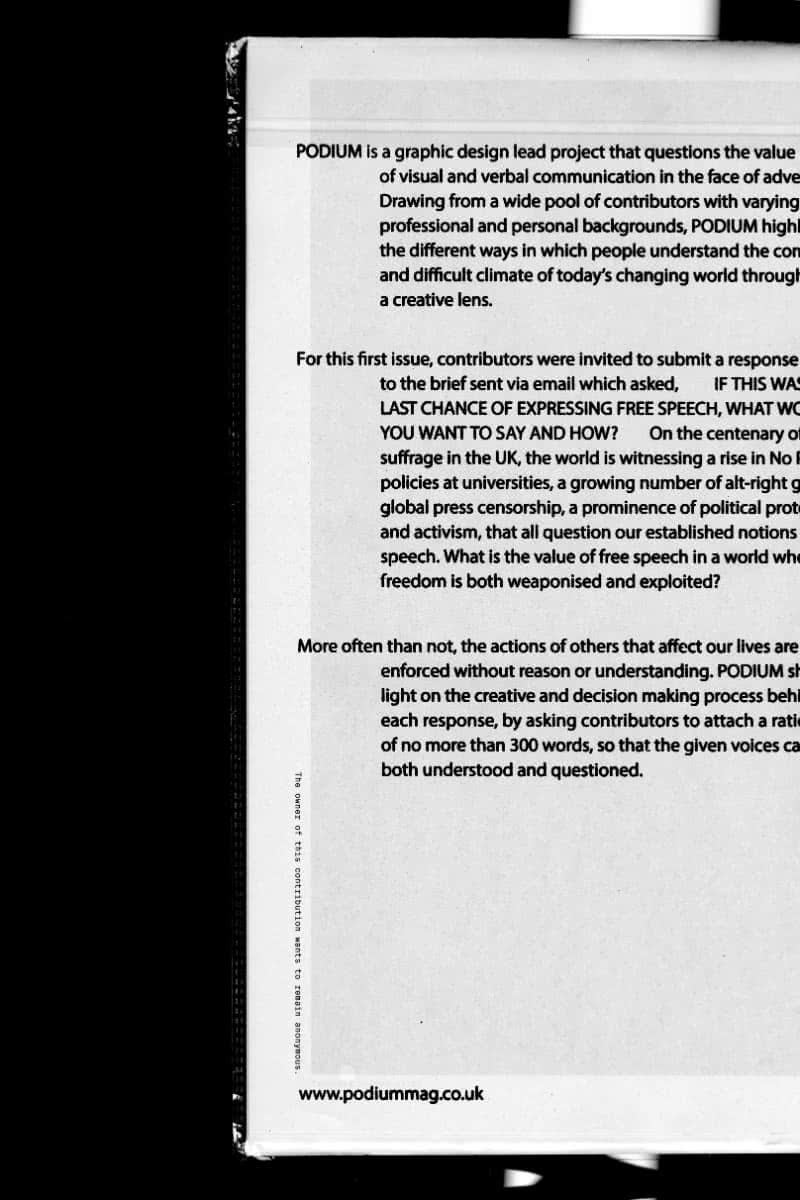
The brief: This is an invitation to contribute to the forthcoming free newspaper publication PODIUM. PODIUM is a collection of voices from a diverse group of contributors with various cultural and professional backgrounds. The publication aims to expose and question what happens to our fundamental right of free speech when under threat from political restrictions and cultural sanctions.
If this was your last chance of expressing free speech what would you want to say – and how?
We are giving you a page in the publication to communicate your ideas. How would you want to use this page? To express your beliefs? To tell your children what you’ve learned in life? To apologise to someone? To be honest? To tell certain politicians to f**k off? To shed light on something? To make someone uncomfortable?
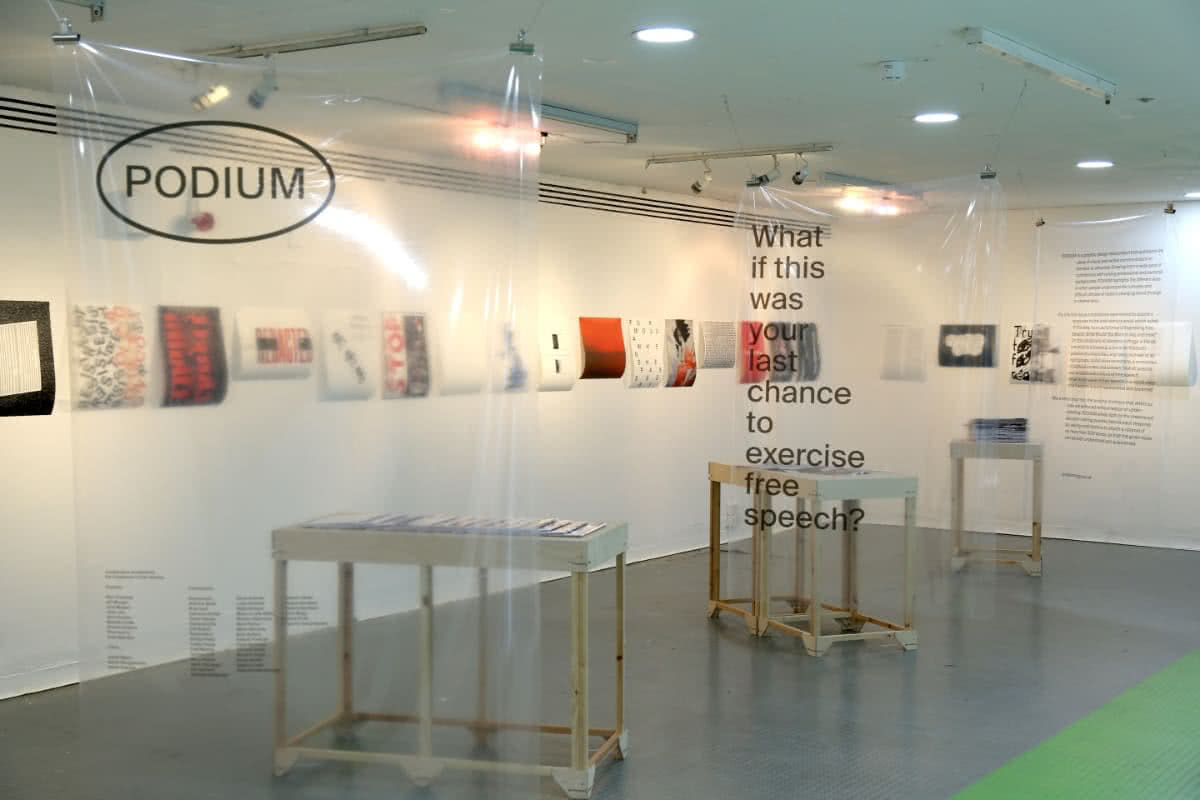
After receiving 36 contributions from all corners of the world we produced PODIUM, which was launched in early April, at the Courtyard Gallery in South Kensington. The launch of PODIUM and the distribution of its contents to the public was the starting point of a new collaboration between us, our contributors and the readers. Therefore, the next question that we faced after the creation of the magazine was how to introduce the project to the wider world.
It was important for us to come up with a solution that embodied the project itself, our intention, the process of its creation and to deliver the core message of the publication. It was essential to outline the collaboration process. Further, we wanted to use the event as a starting point of a new discussion around the magazine and the question that it is asking to the readers.
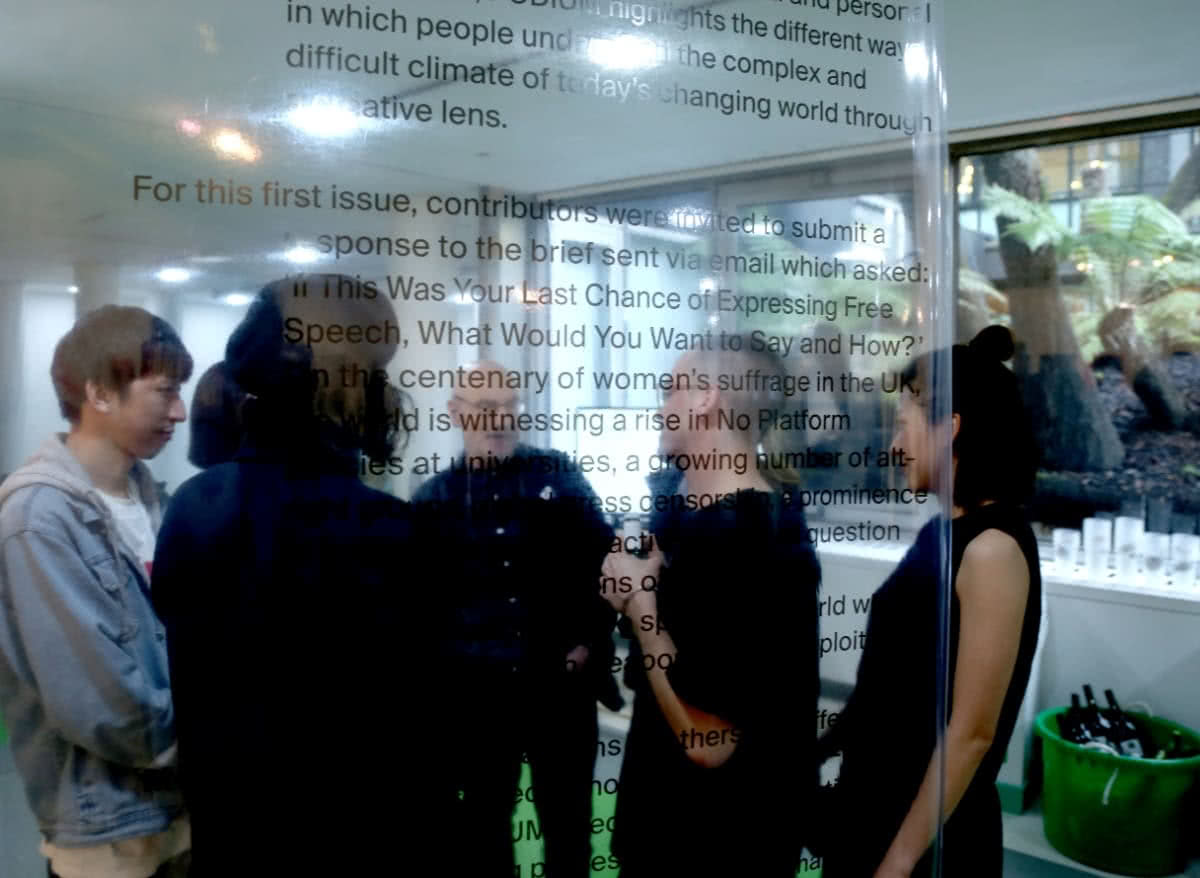
The launch event became an extension of our collaborative process. We asked the audience to respond to the same question we asked contributors. The reactions were highly interesting. Some people used the opportunity to write down their thoughts on the subject, others wrote down their life mantra and inspirational quotes. One response stands out - it was a very critical and questioned our intentions, credibility, depth of research and position to talk about freedom of speech in general. This text resonated within all of us. Yet, this response is the essence of what we wanted to achieve with our publication: open up new conversations – critical conversations – around the topic and ultimately our process of collaboration. During the course of the event in discussion with the audience and contributors, it became clear for all of us, that using counterfactual thinking as a method to reverse realities and ask big questions is exactly what we need at this moment. While we continue to collectively and collaboratively try to find answers to these questions.
